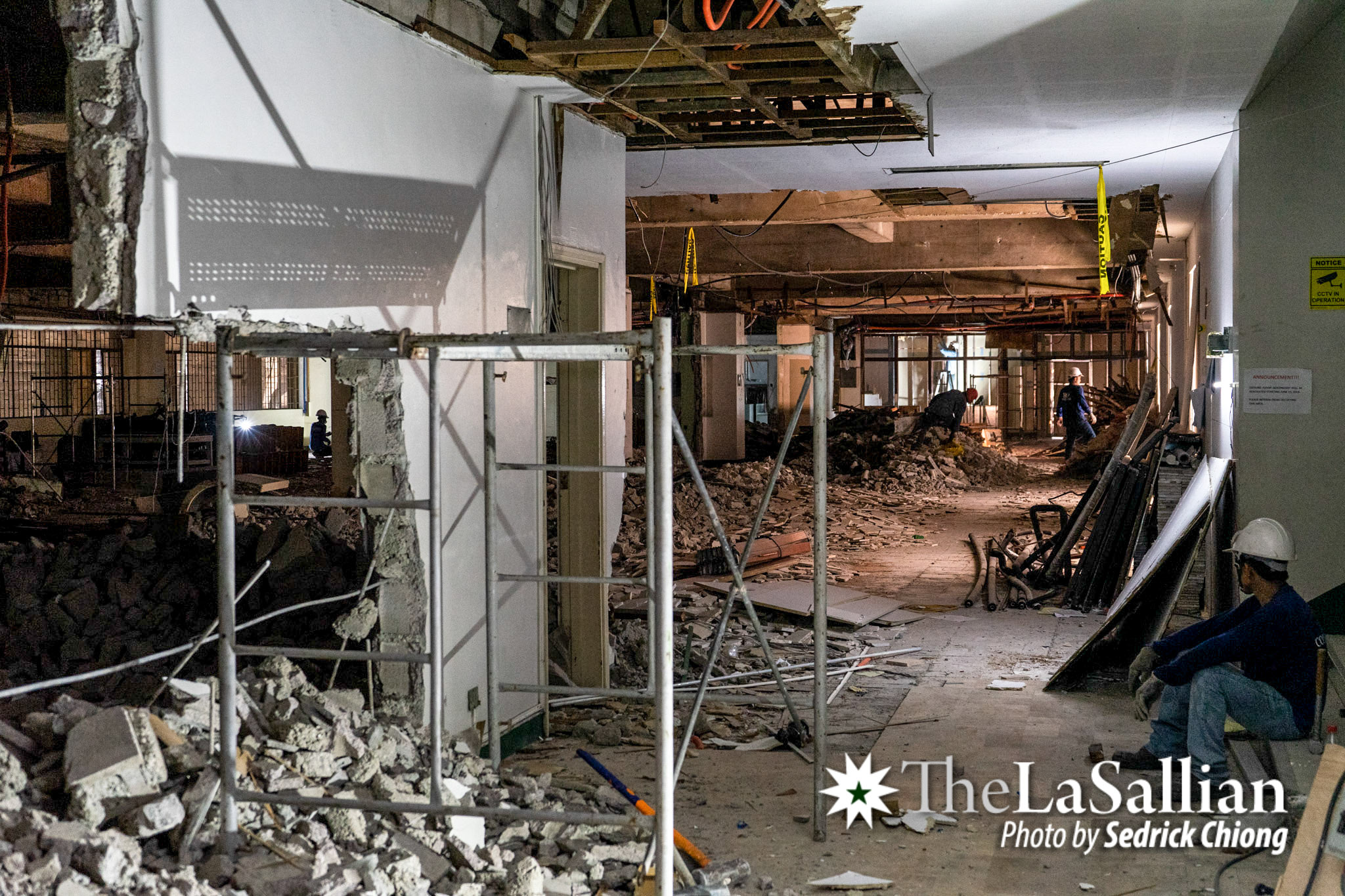Built in the 1990s, the Gokongwei Hall is not only associated with the students of the College of Computer Studies (CCS), but it also served as the home of the National Service Training Program and Formations Office (NFO) since 2017. Given its relative age, the building would eventually need repairs, which is why last June 15, its ground floor was closed off for renovations. Consequently, both the NFO and the 24-hour facility were relocated.
The NFO can now be found at the Medrano Hall of St. La Salle Hall, while the ground floor of Br. Andrew Gonzalez Hall is now being utilized for the study facility, effective since last July 16. According to an email announcement from Vice Chancellor for Administration Dr. Arnel Uy, the Gokongwei Hall’s ground floor’s north side will be converted into five classrooms.

Out with the old
There were a number of reasons that prompted the decision, Associate Vice Chancellor for Campus Development Josemari Calleja reveals. Among those is to address the growing demand for classrooms in the Manila Campus and to leverage the ground floor’s accessibility as a learning space.
Calleja also acknowledges the building’s perennial exposure to the floodwaters of Taft Ave., which he explains was the basis for increasing the elevation of the ground floor by about half a meter. He also warns that floods pose a serious threat to students who frequent the area, and to the school equipment located on the floor. “It is best to avoid using the space for offices where you have desktop computers and keep a lot of physical files,” he explains.
In with the new
After the renovations are completed, the 24-hour study facility will be returned to its original place, Calleja assures. DLSU students will be met with a new and improved ground floor, which features collapsible walls that students can utilize for spontaneous conferences or student activities. A pocket garden at the side will also be integrated “to improve the general ambiance of the place,” Calleja notes. Improving the building’s ventilation and increasing the number of seating options are also being considered.
As for the choice of Br. Andrew Gonzalez Hall as the temporary 24-hour study facility, Calleja explains that the building’s accessibility and proximity to restaurants and coffee shops made it the ideal replacement location. Aside from this, it was also selected because, as Calleja reasons, it was easy “to secure a section of the building for round-the-clock operations with the least amount of resources.”

Further plans
Gokongwei Hall is just the start. Calleja reveals that multiple projects are “in the pipeline” for both the Manila and Laguna campuses. Aside from renovations of the ground floor of the aforementioned building, he also discloses his department’s plans to open a redesigned computer lab on the fourth floor.
Elsewhere on campus, other projects are underway: a new Research Commons will be opened, though Uy clarifies that details have yet to be finalized; the Emilio Yap Jr. Case Room in St. La Salle Hall is in the middle of repairs; the South Gate drop off area adjacent to Br. John Hall is being rebuilt; and the ninth floor of the Enrique Razon Sports Complex is undergoing improvements.
Meanwhile, at the Laguna Campus, a redesign of the Integrated School is being done, which Calleja hopes “[can] make it safer, more fun, and child-friendly.” The Shrine of St. John Baptist de La Salle, which had its groundbreaking ceremony earlier this year, is also in the works.
Student complaints
Despite Calleja’s excitement, students who frequent Gokongwei Hall have not adjusted well, especially since the ongoing construction has been a cause of disruption for classes.
Kyle*, a CCS student, expresses his frustration on the noise caused by the renovations. “If they were to continue with renovations, [then] they at least shouldn’t cause students problems,” he comments, complaining how it has reached the point where he occasionally could not even hear his professor’s lectures.
Despite his frustrations, Kyle does hope that space capacity—an issue Calleja’s office hopes the renovation will resolve—will be among the focuses of Gokongwei Hall’s ongoing renovation. Additionally, he hopes that limited power outlets will also become an issue of the past.
Along with noise disturbances, Sofia Cuevas (I, BSINSYS) also remarks how CCS students have lost a place to stay “while waiting for at least an hour or so for [the] next class,” which she notes is often held in the same building.
While Matthew Lim (I, BSINSYS) does share similar frustrations with Kyle and Cuevas, he believes that Gokongwei Hall is long overdue for a renovation. Demanding better ventilation, Lim laments, “Sometimes, it really felt like it was too hot to stay there, and I have to go to some other place to study.”
Lim also hopes that Gokongwei Hall’s
renovation is a sign that the University is starting to listen to student
concerns. “I hope that they will be able to create
better spaces for students to study [in] and stay at, mainly because we need to
study,”
he concludes.
*Names have been changed for anonymity.
